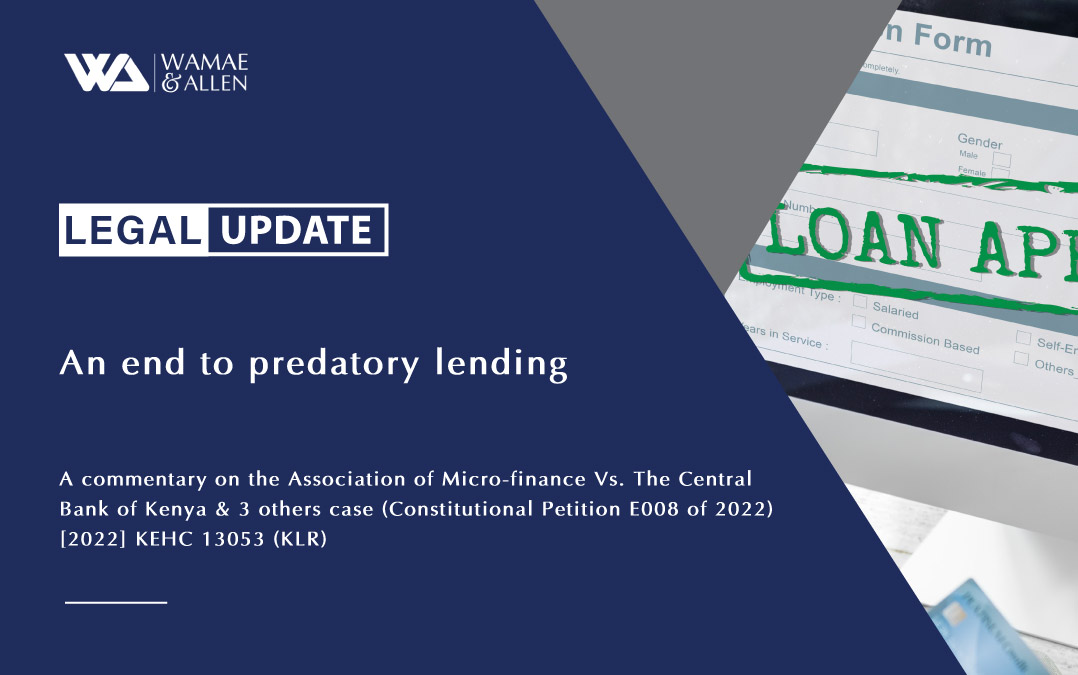The advent of debt and borrowing can be traced back as early as 3,500 B.C, long before the dawn of coinage or money. Digital lending has been introduced as a means to facilitate easy access to loans. Digital lending is now considered a game changer as for many years the lending market was monopolized by banks. Digital lending has been preferred by most as it offers an alternative to the lengthy bank process. Digital lenders in Kenya have existed in a regulatory vacuum where the regulatory framework is narrow and there is a lack of enforcement mechanisms.Parliament, by virtue of the Central Bank of Kenya (Amendment) Act, 2021 (the “Amendment Act”) recognised that the digital lending market, if left untrammelled, would run amok to the detriment of consumers. This is because a considerable number of Kenyans borrow have resorted to Digital Loans. So lucrative is the shylock economy and thanks to the advent of mobile banking, that digital lenders have lunged into shylocking eyeing the good returns in this niche market. They have since unveiled a number of products targeting this growing yet uncontrolled market segment.This paper will discuss the legal challenge to the constitutionality of the Act.
FEATURES OF THE AMENDMENT ACT
The Amendment Act assented into law on the 7th day of December 2021 with its effective date being the 23rd day of December 2021. The main objective of this legislation was to regulate and bring the digital lending space under the control of the Central Bank of Kenya (CBK). Under this “oversight” role, the Central Bank of Kenya has been granted the power to license digital lenders as well as ensure fair and non-discriminatory practices in the digital lending market.
Other than the aspect of licensing introduced by the Amendment Act, information sharing and reporting obligations have been placed on digital lenders who are now required to disclose to the licenced Credit Reference Bureaus (CRBs) positive or negative information regarding borrowers for the discharge of their functions. This will assist in building the credit history of the customers noting that there already exists a suspension on the listing of negative information of borrowers for a period of twelve (12) months from October 01, 2021, pursuant to Legal Notice No. 225 of November 5, 2021.
Previously, these digital lenders were not regulated. Digital lenders were left to determine the interest rate chargeable on their loans. In the event of default, some of the digital lenders impose late payment fees which would be in excess of the in duplum rule. Further, digital lenders are usually quick to remedy defaults to ensure the recovery of their funds.
These digital lenders also acted in breach of the Data Protection Act, since most applications would mine consumer data such as their contacts and messages, for the sole purpose of embarrassing the borrower to compel payment in cases of default. Some digital lenders are known to resort to unorthodox means of debt collection such as threats, debt shaming and incessant messages and calls to the customers.
FACTS
According to the petitioners, the Amendment Act, which amended section 59 of the principal Act, was unconstitutional for violation of Articles 2, 10, 20, 21, 22, 23, 159(2)(e), 165, 258 and 259 of the Constitution. The thrust of the petitioner’s case was that there was no public participation before the enactment of the amendment. The amendment was also impugned on grounds of discrimination. On this discrimination ground, the petitioner argued that there is no justifiable rationale and objective that has been offered by the Respondents as to why the impugned regulations exempted banks, micro-finance banks and businesses licensed under the Microfinance Act, Saccos among others and the same failed to exempt the non-deposit taking micro-finance institutions yet they undertake similar businesses only that the later does not receive deposits from its customers. Lastly, the amendment was impugned on grounds of unreasonableness and unfairness, contrary to the Fair Administrative Action Act.
The respondents on the other hand argued that the amendment was informed by the previous non-regulation of digital lenders. The CBK argued that such non-regulation caused a situation where the members of the public complained about the conduct of non-deposit-taking microfinance institutions particularly those in the digital credit business. These issues, it was averred, ranged from predatory practices, high cost of the facility and other charges up to 200% per annum, unethical debt collection practices including contacting personal contacts of borrowers; and abuse of personal information, among others. There were also concerns about money laundering and financing of terrorism.
THE RATIO DECIDENDI
Firstly, the court made a finding that unless there is an allegation of a specific violation of the Constitution, the court cannot question the wisdom of legislation or its policy object. Therefore, the court could not second guess the legislature’s decision as to when to legislate, what to legislate and how much to legislate and to decide the timing, content and extent of the legislation. The Court also held that vague contentions such as arbitrariness, unreasonableness or irrationality without more do not warrant the striking out of enactment unless some constitutional infirmity has to be found.
Concerning public participation, the court held that the Respondents elaborately set out the steps taken in the enactment of the Amendment Act and the formulation of the Regulations which steps were not challenged by the Petitioner. Therefore, the failure of the petitioner to participate in the public participation process could not be blamed on the respondents.
The next issue was whether Regulation 2 of Digital Credit Providers Regulations was discriminatory for exempting Banking, Micro – Finance Act, and Sacco Societies Act among others but fail to exempt non –deposit taking Micro – Finance businesses who are yet to be regulated under the Microfinance Act, the same are discriminatory against non – deposit taking microfinance institutions whose nature of business is similar to banks and institutions licenced under the Micro – Finance Act since they too offer financial and non-financial services. To determine whether the amendment was discriminatory, the court applied the “two-part “discrimination test coined by the Constitutional Court of South Africa in Harksen vs. Lane NO and Others (1997) 11 BCLR 1489 (CC) and cited in approval in Pevans East Africa Limited v Betting Control and Licensing Board & 2 others; Safaricom Limited & another (Interested Parties) [2019] eKLR. According to the judge, while it was true there was differential treatment in the exemption of Banks, Microfinance Institutions and Sacco’s, the petitioner failed to satisfy the second limb of the discrimination test since there was a rational and plausible reason for the differential treatment.
In this regard, the respondents had satisfactorily explained that the reason for the exemption of banks, SACCOs and microfinance institutions under regulation 2 is that these institutions are already regulated under the Banking and Microfinance Act 2006 and Sacco Societies Act, unlike the digital credit providers. Furthermore, the court found that the need to regulate digital credit providers was informed by the legitimate aim of the amendment to protect the public from previously unregulated digital credit providers.
In conclusion, the court found that the enactment of the Amendment Act, 2021 and the Central Bank of Kenya (Digital Credit Providers) Regulations, 2022 cannot amount to infringement of the constitutional rights of the Petitioner. On the contrary, the regulations are necessary to superintend, the manner in which digital credit providers conduct their business in the interest of the public that relies on such services.
IMPLICATIONS OF THE JUDGMENT AND CONCLUDING REFLECTIONS
Firstly, the judgment reinforces the general consensus that the digital lending market was comprised of unregulated entities that took advantage of hapless borrowers from low-income groups. The judgment is a judicial imprimatur to rein in digital lenders and bring order and sanity to the digital lending sphere for the benefit of consumers.
Secondly, in line with the Judgment of Mabeya J in Anne J. Mugure & 2 Others Vs. HELB Case, Petition No. E002 of 2021, the in duplum rule now applies to digital lenders. This means that when interest on sums advanced by digital lenders equates to the capital of the debt, interest ceases to continue accruing.
Thirdly, in line with the Central Bank of Kenya (Digital Credit Providers) Regulations, 2021, the conduct of digital credit providers is regulated. Digital lenders are prohibited, in their recovery efforts, from using threat, violence or other means to harm borrowers, their reputation or property; or accessing borrowers’ contacts lists and using obscene or profane language for purposes of shaming them; or using improper or unconscionable debt collection tactics, methods or conduct.
Lastly, by virtue of the regulations, digital lenders are to put in place appropriate policies, procedures and systems to ensure the confidentiality of customer information and transactions. They must also comply with principles of data protection under the Data Protection Act by informing their customers of the terms and conditions of the loan before granting the loan. Any changes must be notified to the customer at least 30 days before their effective date. Customers are also entitled to receipts of transactions and upon request, a comprehensive statement of transactions carried out by them. Advertisements must not include false, misleading or deceptive representation.
In this digital age, innovation constantly races ahead of regulation. While advancements in the lending sector are welcome, the need for great care and protection of consumers of these products is needed provided regulators endeavour to promote positive growth and consumer protection rather than impeding its growth.
This article is provided free of charge for information purposes only; it does not constitute legal advice and should be relied on as such. No responsibility for the accuracy and/or correctness of the information and commentary as set in the article should be held without seeking specific legal advice on the subject matter. If you have any query regarding the same, please do not hesitate to contact Litigation vide litigation@wamaeallen.com
